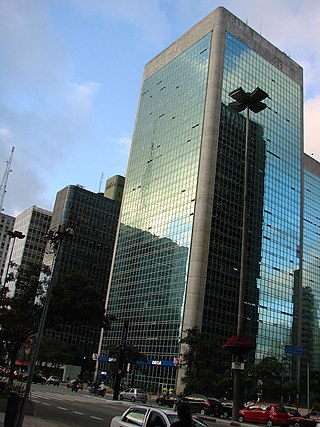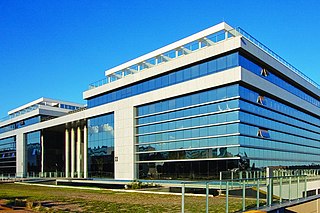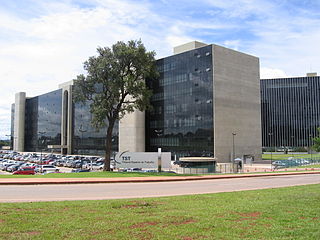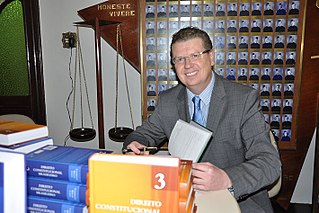
The Federal Supreme Court is the supreme court of Brazil, serving primarily as the country's Constitutional Court. It is the highest court of law in Brazil for constitutional issues and its rulings cannot be appealed. On cases involving exclusively non-constitutional issues, regarding federal laws, the highest court is, by rule, the Superior Court of Justice.

The law of Brazil is based on statutes and, partly and more recently, a mechanism called súmulas vinculantes. It derives mainly from the European civil law systems, particularly the Portuguese, the Napoleonic French and the German.
Regional Electoral Court is the judicial body that is in charge of elections at the state level in Brazil. There are 27 TREs, one for each Brazilian state, plus one for the Federal District.

The Superior Court of Justice is the highest appellate court in Brazil for non-constitutional issues regarding federal law. The STJ also has original jurisdiction over some cases. Its jurisdiction is provided for in Article 105 of the Brazilian Constitution.

The Regional Federal Courts are the courts of appeal in the Federal Courts of Brazil, the second instance courts of the Brazilian federal justice system, responsible not only for appeals of trial court decisions, but also for writs of security, habeas corpus, and habeas data against acts by federal judges, motions to set aside judgments, criminal revisions, and conflicts of jurisdiction.
The federal court system of Brazil has all its organs and competences listed and defined in the Brazilian 1988 Constitution. The National Justice Council is an exclusively administrative organ of the federal court system.

The National Council of Justice (CNJ) is an administrative and oversight organ of the Brazilian Judiciary created by constitutional amendment in 2004 as a part of judicial reform. Among its responsibilities are ensuring that the judicial system remains autonomous, conducting disciplinary proceedings against members of the Judiciary, and compiling and publishing statistics on the Brazilian court system. The Council has nationwide jurisdiction over all courts except the Supreme Federal Court, but makes no rulings on cases and does not review judgements of other courts. Its fifteen members are chosen by the Supreme Federal Court for two-year terms.

Regional Labor Courts are Brazilian appellate courts of the Federal specialized court system for matters of labor law. There currently are 24 Regional Labor Courts, geographically defined by numbered Regions.

The Superior Labor Court, is the highest Brazilian appellate court for labor law issues. Its headquarters are located in Brasilia, near the American Embassy.

The Judiciary of Brazil is the group of public entities designated by the Brazilian constitution to carry out the country's judicial functions.
The Federal Government of Brazil is the national government of the Federative Republic of Brazil, a republic in South America divided into 26 states and a federal district. The Brazilian federal government is divided into three branches: the executive, which is headed by the President and the cabinet; the legislative, whose powers are vested by the Constitution in the National Congress; and the judiciary, whose powers are vested in nine organs, including the Supreme Federal Court and lower federal courts. The seat of the federal government is located in Brasília.

The Brazilian Election Justice was created by Decree No. 21,076 of 24 February 1932, representing one of the innovations of the Brazilian Revolution of 1930. In 1932 the first edited Brazilian election code was passed. It was inspired by the election justice of the Czech Republic and the ideas of Joaquim Francisco de Assis Brasil, a politician, farmer and ambassador.
The Brazilian municipal elections of 2012 took place on October 7 and on October 28. Over 138 million voters chose mayors, deputy mayors and city councillors for the 5,568 municipalities of Brazil. These were the first elections in which the recently registered parties Partido Pátria Livre (PPL) and Partido Social Democrático (PSD) participated; they were both recognized by the Superior Electoral Court in 2011. Political parties whose candidates wished to run for the 2012 elections had to be registered at the TSE for at least one year before the election date, while candidates also had to be affiliated to a party for the same period of time. Conventions for the selection of candidates within the parties occurred between 10 and 30 June, while the registry of candidates and alliances with the Regional Electoral Courts took place until July 5. Electoral campaign was authorized from the moment a candidacy had been registered. The free electoral program – two daily slots on free-to-air TV and radio for political advertising paid by the Electoral Justice fund – ran weekdays from 21 August until 4 October. According to the current Brazilian electoral law, the two-round system – should the leading candidate receive less than 50% +1 of the votes – is only available for cities with more than 200,000 voters. This includes all state capitals, with the exception of Boa Vista, Roraima and Palmas, Tocantins, plus 59 other municipalities. The free electoral program for the second round ran from 13 October until 26 October.

Lei da Ficha Limpa or Complementary Law no. 135 of 2010 is a Brazilian act that amended the Conditions of Ineligibility Act. It was the fourth bill proposed by direct people's initiative as law in Brazil. It was devised by Judge Marlon Reis and received about 1.3 million signatures before being submitted to the National Congress. The act makes a candidate who has been impeached, has resigned to avoid impeachment, or been convicted by a decision of a collective body ineligible to hold public office for eight years, even if possible appeals remain.

Clèmerson Merlin Clève is a Brazilian jurist, Law school professor, and lawyer.

Alexandre de Moraes is a Brazilian jurist, ex-politician, former president of the Superior Electoral Court and currently justice of the Supreme Federal Court.
The Democratic Renewal Party is a political party in Brazil, established on 26 October 2022 from the merger of two conservative parties: the Brazilian Labour Party (PTB) and Patriota. Said merger was motivated by the results of the 2022 general election, since both parties failed to obtain the number of votes to meet the electoral threshold. With the union, the votes of the two parties were summed up and the new organization was considered to have reached the threshold.

The electoral system of Brazil is the set of means used to choose representatives and government members of the Federative Republic of Brazil. The current system is defined by the 1988 Constitution and the Electoral Code, in addition to being regulated by the Superior Electoral Court as delegated by law. The Constitution itself already defines three distinct electoral systems, which are detailed in the Electoral Code: proportional elections for the Chamber of Deputies, mirrored in the legislative powers at the state and municipal levels, majority elections with one or two elected representatives to the Federal Senate and majority elections in two rounds for president and other executive heads in other spheres.

The Brazilian criminal justice system comes from the civil law of Western Europe, in particular Portuguese law, which derives from Roman law. The earliest legal documents in Brazil were land grants and charters dating to the early 16th century, which continued to be used until independence in 1822. Various basic principles of law are enshrined in the 1988 Constitution, such as the principle of legality and the principle of human dignity.

José Paulo Sepúlveda Pertence was a Brazilian jurist, professor, lawyer, and judge. He held numerous positions, including Prosecutor General of the Republic, minister and president of the Federal Supreme Court (STF), and president of the Public Ethics Commission of the Presidency of the Republic.















